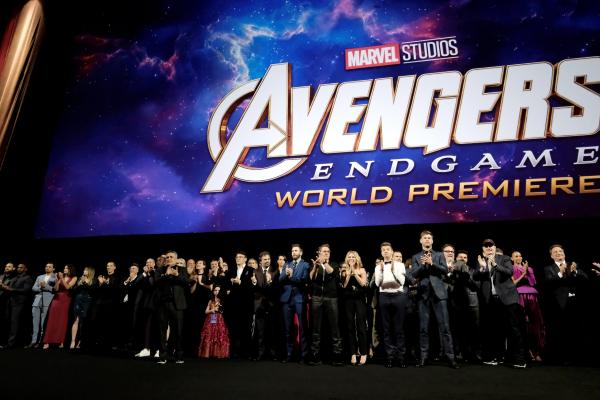“Humans are odd. They think order and chaos are somehow opposites, and try to control what won't be. But there is grace in their failings.”
—Vision, Avengers: Age of Ultron
The first line of Avengers: Endgame is “Do you know where you’re going?” And the story that follows, the final chapter of a saga 11 years in the making, is an attempt by the deeply flawed, deeply human protagonists at wrestling with that question — what is our path, do we know it, and can we change it?
Endgame is the direct follow-up to Avengers: Infinity War, a film that brought all the heroes of the franchise together only for them to shockingly lose, and, as a result, for half of all life in the universe to be destroyed. The long road to this defeat can be traced all the way back to the beginning of the series, as in film after film, the protagonists’ human failings pave the way for the enemy’s victory. (It may have been a coincidence that Endgame was released less than a week after Easter Sunday, but it was difficult not to draw parallels between Infinity War and the road from Gethsemane to the cross — and between the year-long wait for Endgame and Easter.)
The principal antagonist of Endgame and in many ways of the entire 22 film, 11 year saga, is Thanos, a fanatical villain whose name resembles the Ancient Greek word for death (Thanatos), and who repeatedly tells the heroes trying to stop him: “I am inevitable.” The plots of both Endgame and Infinity War are driven by visions and predictions coming to pass, for better and for worse, and it is made clear in both films that the apocalyptic is necessary in order to achieve the redemptive — that the only possible future in which Thanos is defeated is a future in which Thanos is first allowed to win. As in the biblical narrative, and as in much of the Western literature that these stories draw from (Greek tragedy, Shakespeare), there is a strong sense of destiny at work, of a larger plan often being inscrutable to those living through a particular moment but often visible in retrospect.
Endgame is about the quintessential human struggle perhaps best articulated by in Reinhold Neibuhr’s Serenity Prayer: “God grant me the serenity to accept that which I cannot change, the courage to change that which I can, and the wisdom to know the difference.” It is about inevitability in the form of prophecies fulfilled — questions such as: Are we weak and helpless in the face of forces greater than ourselves? Our enemies, our pasts, our inner demons? Can we redeem ourselves and therefore change the world? Depending on one’s perspective, these questions can be either challenging or liberating.
This is indeed a film that reminds us of some of the things against which we are all powerless: the passage of time, the inevitability of death, the extent to which our flaws and blind spots direct our lives. We are again and again presented with the difficult lesson that not everything is up to us, and there are a great many things we cannot change. We see our heroes living in the aftermath of Thanos’ victory in Infinity War, attempting to come to terms with that catastrophic, cosmic failure, and doing so in different ways — some healthy and some much less so. Our heroes retreat into family life, throw themselves into helping others, seek misdirected revenge, pour themselves into their work, isolate themselves from the world, and numb themselves with alcohol.
When presented with new information that offers unexpected hope that Thanos may not, in the end, have had the last word, the Avengers must individually come to terms with that hope, summoning the courage to attempt to change the unchangeable. We see them struggle with the knowledge that if they achieve their seemingly impossible goal, it will come at great cost and unspeakable sacrifice, especially for those who have the most left to lose.
Here is where we see the counter-narrative to this sense of destiny or inevitability, and the key role of agency and free will in the human experience. In the end, what the Avengers and their allies achieve is accomplished against all odds. Characters surpass their limits in unexpected ways that surprise even themselves. They grow, they sacrifice, they act against their self-interest. They notably move beyond their histories, their insecurities, and the sins of their fathers. Instead of following the expected path, they pave their own.
In one affecting scene, a character’s parent tells him that “everyone fails at who they’re supposed to be. A measure of a person, of a hero, is how well they succeed at being who they are.” We see our heroes achieve their redemption as they express this lesson in their own ways. Characters move from self-interested to utterly selfless, and from self-sacrificing to self-caring. They come face to face with their deepest loves and greatest motivators, forcing them to reckon with what brought them to this fight in the first place, and what they will need to reconnect with in order to bring their best, strongest, and most resilient selves to the final battle.
This gets to the core of why the Marvel Cinematic Universe (MCU) has had such unprecedented success over the past decade, and why Marvel comics have been beloved for even longer: Our heroes, even those not from Earth, are deeply human, with human flaws, and their struggles with those flaws feel just as meaningful as their struggles against supervillains and galactic catastrophes. The reasons for the grand, cosmic defeats our heroes experience are inextricably tied to their own human failings, just as the ultimate triumph also comes from each of them understanding and tapping into fundamental truths about themselves.
More than anything, Avengers: Endgame is about the redemptive power of human imperfection — how we try, and fail, but our failures are necessary for a greater victory. Whether we know where we are going or not, we know that our defeats are not the end, and our failures will never have the last word.
Got something to say about what you're reading? We value your feedback!








